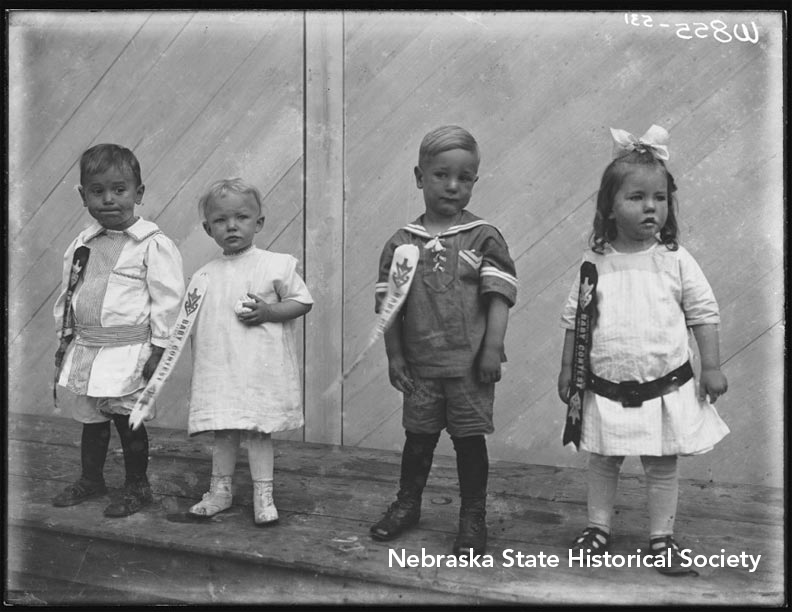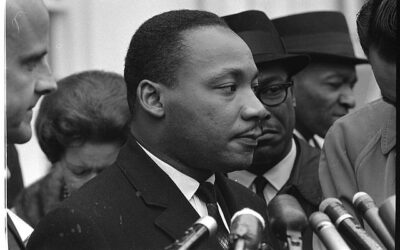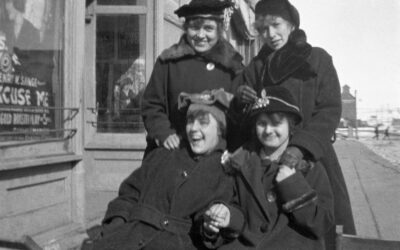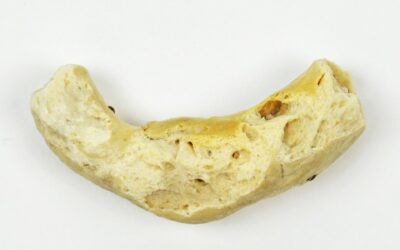 Caption: Photographer Emanuel Wolfe depicted several finalists in a Nebraska better baby contest, each wearing a prize ribbon. NSHS RG2836.PH0-532
Caption: Photographer Emanuel Wolfe depicted several finalists in a Nebraska better baby contest, each wearing a prize ribbon. NSHS RG2836.PH0-532
“If better live stock, why not better babies?” asked a member of the Grange in the pages of the Farm Journal (Philadelphia) in December of 1913. It was a natural question occasioned by growing interest after 1900 in child development and concern over high infant mortality in the United States. Baby shows, long a staple of state and local fairs and church festivals, became contests to select “Better Babies,” in which young children were examined for physical and mental development and scored for points according to standards of weights and measurements, very much as livestock was scored at agricultural fairs. The Nebraska State Fair in 1914 hosted a Better Babies contest in which “champion babies” were selected to receive prizes on the basis of points awarded under such a scoring system. The Red Cloud Chief on October 1, 1914, described the contest, divided into rural and urban classes, and open to children from eighteen to thirty-six months of age. “Nearly every county in the state was represented, . . . The result of the contest goes far toward proving that more and more attention is being paid to the welfare and physical training of the little ones, as parents arrive at a better understanding of their needs and requirements. This is evidenced by the increasing attention being given to wholesome sports, and playgrounds, and other outdoor amusements for the ‘kiddies.’ “Mrs. Vance, the superintendent, is much pleased at the interest displayed at the contest, and at the growing interest among parents along the line of hygienic surroundings in the home. As a point she cites an instance of a baby which scored next to the lowest among the 500 babies in last year’s baby contest, and took third prize in its division of this year’s contest. When the mother brought in her baby she said, ‘I believe I have brought my baby’s score up this year,’ and she had. On learning of her baby’s low score last year, she had started in at once to scientifically better her baby’s physical condition. She studied the baby and studied scientific methods of treating it, with admirable results.” Arthur Van Gorden of Gresham, aged twenty-three months, was declared “a perfect baby, according to the decision of the committee on awards at the Better Baby show at the state fair. . . After the decision of the judges the baby was re-examined by the doctors, but not a blemish nor a defect could be found, although a scientific examination, including over 100 points was made. He was given a gold medal and $25.” Other prize winners included Howard Richard Kidney, aged twenty-four months, of rural Lincoln, declared the champion rural boy; and Dorothy Grace Field of rural Lincoln, aged twenty-one months, the champion rural girl. “Denice Green of Elmwood was compelled to divide her prize of $25 with another baby, both of them scoring 99.5 per cent. The little lady is 21 months old. . . . May Beth Ryerson, who tied for the city baby championship, . . . was given a bronze medal and half of a $25 prize.” Such contests, popular for a time with parents and the public, tended to foster eugenic ideas, which tried to “improve” genetic features of the human population through selective mating and sterilization-ideas which have since fallen into disfavor.



